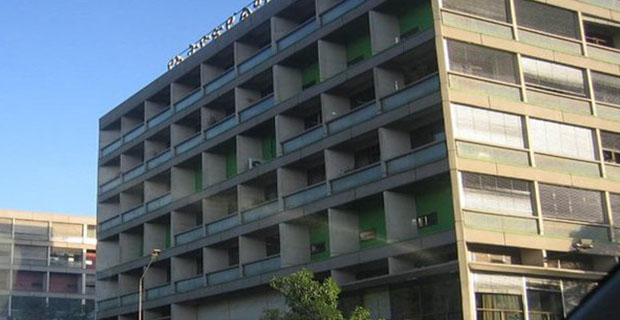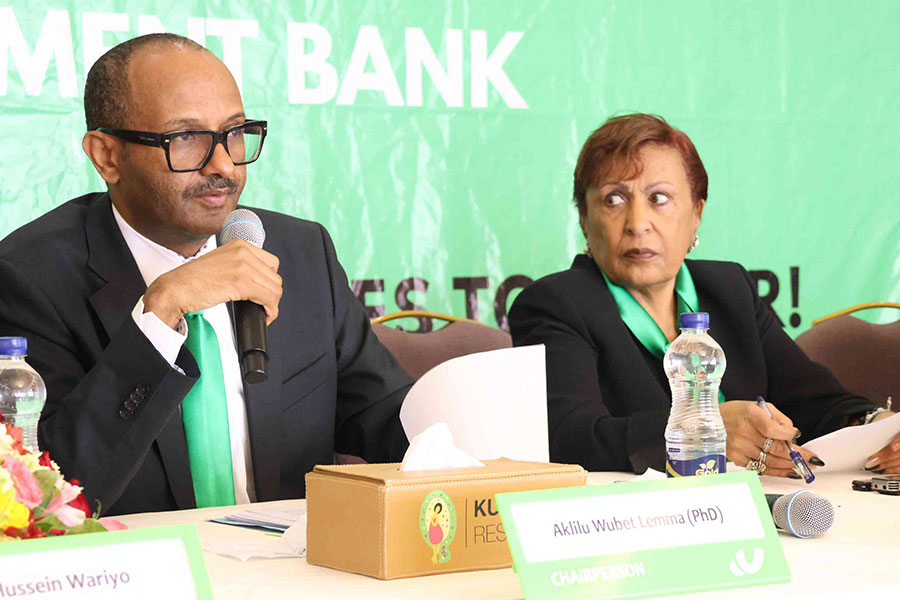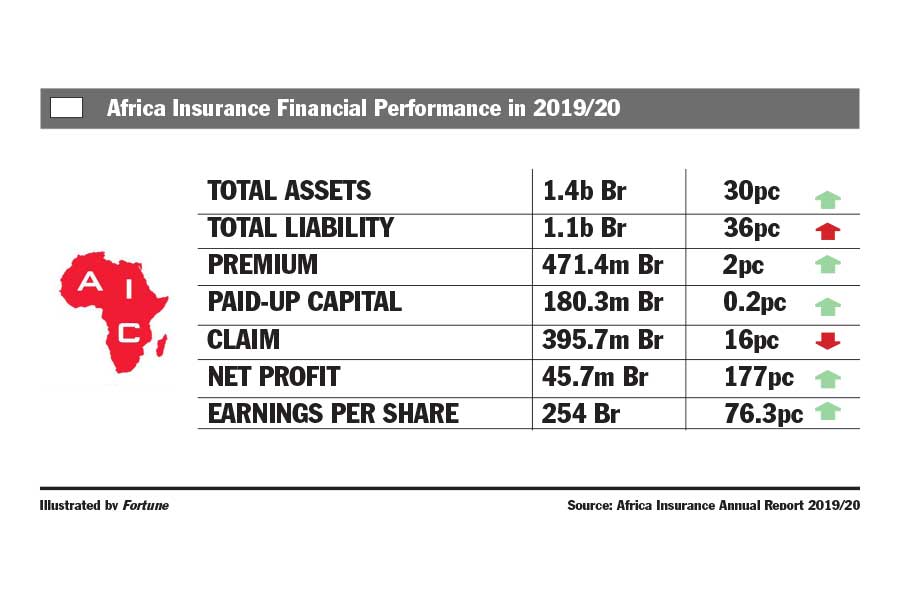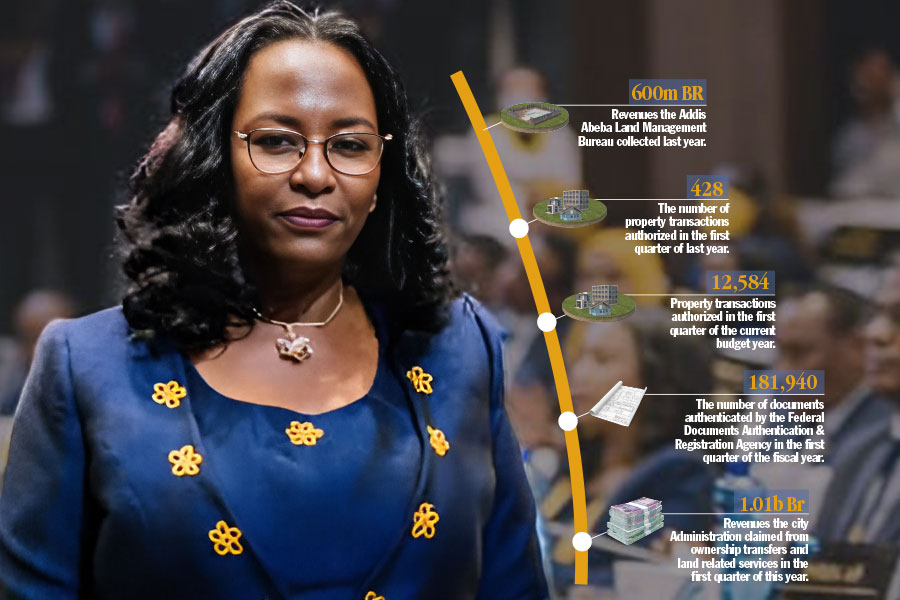
View From Arada | Dec 19,2020
On midday last week, a few hours short of the customary lunchtime, the 40-year-old Fozia Nesro and her sister walked into one of the private hospitals in the capital to get routine dialysis treatment. Her worried expression and a shortened breath reveal her pain within, covered by the matching emerald green abaya and hijab.
Last year, Fozia was diagnosed with kidney failure and began taking dialysis treatment three times a week ever since.
As the sole breadwinner for her mother and sister, she was forced to go to the Middle East, Beirut, to make ends meet, working in a hair salon for 13 years. She believes that standing on her feet for more than 12 hours daily due to the nature of her work was the cause of her illness.
Fozia had a follow-up at St Paul's Hospital eight months ago. The long queue to get dialysis treatment every three-day has forced the weakened Fozia into the hands of private hospitals where more convenience is provided - for a price. She was digging into her pockets and then some help from her family for the past six months, which has maxed out.
A month ago, Fozia's last option was to sell her property and get a kidney transplant rather than the plundering dialysis. The house was valued at 2.5 million Br, about enough to receive a transplant operation overseas.
"I built my house with the money I saved working in Beirut," she told Fortune.
Suddenly, she was met with the unpleasant news that the transplant she had been preparing for so long was cut short. A letter signed by Biniyam Mikeru, chief of the Addis Abeba Cabinet Secretariat, instructed districts across the city to suspend transfers of title deeds and related services for unmovable assets.
Adanech Abiebie's mayorship of Addis Abeba over the last year is marked by news about the partial or complete hiatus on land-related services, all too familiar to residents of Addis Abeba. In August last year, the City Administration suspended all land-related services claiming to battle extensive illicit construction activities before rescinding them four months later.
The consequences they impose go beyond disrupting plans and inconveniencing citizens.
In a letter issued in August last year, the City Administration suspended all land-related services to halt, blaming extensive unlawful construction activities. Four months later, the edict was rescinded, and orders were dispatched to all branch offices to resume services.
"We execute orders issued by the Mayor's office," said Tesfaye Chane, deputy director for Addis Abeba's Land Management & Development Bureau.
About seven months later, in August 2022, new blueprints for construction were no more issued in Tesfaye's Bureau as "fraudulent" cases became rampant after the issuance of land-holding certificates began. Before the suspension, authorities had hoped to register land holding for around 34,000 farmers in the city's six districts, within three months. The city’s Urban Agriculture Development Commission and Land Management Bureau are working jointly to verify the authenticity of the already submitted landholding requests.
At the end of September this year, the City Administration banned property transactions through designates, a.k.a power of attorney rights, demanding leases or property owners to appear in person before transactions are legitimised. A month later, the ban was revised, allowing residents with disabilities, those unable to move due to illness and members of the diaspora to use their power of attorney rights, while share and private limited companies could get services through their general managers or directors.
The Addis Abeba Land Management & Development Bureau, under Kenia Yadeta, provides close to 16 land-related services to thousands of residents daily. Yeka District is one of the 11 districts where cases of design permits and transfer deals between sellers and buyers are made. The walls of the six-storey building are decorated with notice posts on the suspended and activated services that arbitrarily surface.
Tekelemariam Atelaw works in the Yeka District; he serves an average of 15 individuals daily who come to transfer ownership deeds for various reasons.
"The weekdays before the ban were overcrowded," said Tekelmarim.
On a hot weathered afternoon, one of the days last week, Teklemariam and his colleagues did not seem as busy as they were before the embargo.
The same could not be said about the Kirkos District, which provides significantly low transfer services than Yeka.
Eight of the 10 weredas under the District are digitally registered and get services from the city's Landholding Registration & Information Agency branch. According to Mesfin Hailu, the District's landholding services team leader, buyers' and sellers' financial backgrounds are checked before deals are allowed to prevent illegal transfers. He sees no other mechanism in place to detect whether deals are lawful.
City officials claim the ban is enforced to address "fraudulent" real estate and lease transactions. They say it comes following a city-wide investigation by the Mayor's Office that claims to have discovered illicit activities in property dealings and illegal land possession.
It is becoming a nightmare to the 34-year-old Ayanachew Betre, a house dealer who earns a two per cent fee from each transaction he brokers. He is responsible for a family of six.
Hoping to grab the attention of buyers two weeks ago, he posted the advertising on a website for a four-storey house up for sale, located in the Summit area, valued at 23 million Br. However, his phone has not rung once.
"My livelihood is threatened," he said.
After three years of experience, he witnessed his career taking a turn for the worst over the last two years. It has become tedious for him to find a homebuyer willing to pay in advance and wait until the embargo is lifted. He saw that when transfers are suspended, people do not trust each other enough to complete the authorization process after bans are lifted.
Abebe Wendimagegnehu was unaware of the service ban until he visited the Bureau last week.
The 58-year-old, completely dumbfounded about where he was supposed to go, slowly walked into one of the dozen offices in the building. The father of three and his sister, Almaz Wendimagegnehu, live in the eight-room residential house built on an 80Sqm plot; they bestowed the house without transferring their father's ownership to theirs for a decade.
Hearing the rumours that the area might be demolished soon, Abebe visited the Bureau to finally start the transfer process with the anxiety of missing out on the "proper" compensation.
Abebe had already paid a service fee of 40,000 Br before the ban and is now forced to wait for it to be lifted.
"We don't know what to do," he told Fortune.
"It can be demolished any time."
Legal experts view the city administration's slipshod decisions as nothing less than infringements on constitutional rights to own and transfer properties in ways they deem appropriate. They argue the arbitrary and bureaucratic moratoriums are themselves unlawful.
Arba Beyene, a private advocate of law specialising in property issues, is one of the lawyers arguing the city Administration is violating citizens' rights to buy and sell properties granted by the civil code and enshrined in the Constitution. The expert vehemently contended that the Constitution could not be repealed with a circular.
What happens at the Federal Documents Authentication & Registration Agency seems to stand contrary to the city authorities' orders. The Agency continues business as usual, authenticating contracts by its 14 branches. In the first quarter of the fiscal year, it authenticated 181,940 documents, including contracts for leased land.
However, Alemshet Meshesha, communications head of the Agency, observed a decline in the number of visitors stepping into the doors of the Agency's branches to get a service after the suspension. The Agency also authenticates ownership transfers for houses, businesses, shares, and vehicles.
"Even if the transaction has been authenticated, the remaining process cannot be completed," said Alemshet. "Using their own property is citizens' right."
The loss and pain from the hiatus in property transactions are not limited to residents like Fozia, Ayenachew, and Abebe, whose plans are disrupted and inconvenienced by official fiat. The City Administration is subjected to a loss of revenues estimated to surpass half a billion Birr.
Based on a directive issued by the Administration in 2012, the Addis Abeba Land Management Bureau experts estimate the values of a property and levy a six percent tax, besides service fees imposed on sellers to pay. The fees are collected from the district offices and transferred to the Bureau; the latter receives the revenues on behalf of the city's revenue agency.
Last year, the Bureau collected over 600 million Br, covering only 23pc of the target city administration set. Officials at the Bureau blamed the City Administration's on-and-off suspension for the considerable revenue loss. The figure illustrates how the property market is severely impacted. In the first quarter of last year, 428 property transactions were authorized. During the same period of this year, the number increased to 12,584. In the first quarter of this budget year, the City Administration claimed a billion Birr from ownership transfers and related services.
The measure the municipality took to stop "land-related illegal activities" has become a hard pill to swallow for real estate companies. The impact is plunging and inarguable to developers such as Flintstone Homes, a real estate firm with 14 years in business. With an aggregate investment of 5.8 billion Br, Flintstone Homes has built over 3,000 homes in 15 locations throughout the capital, delivering half of these to buyers.
The Deputy Manager, Biruk Shimelis, blames the City Administration for closing the door on everyone instead of taking action against the few "illegals".
The wave of previous proscriptions also hit reals estate developers; they are on the challenge to settle its spillover effect, which is tax debt. Due to its inability to fully recover from the tax arrears, the real estate company in the high-income taxpayers' category cut deals with tax authorities to pay monthly.
The unavailable plots made Flintstone look for a joint venture with landholders living abroad at the capital's prime locations. Upon completion, the real estate company hands over the agreed share of the apartments built to the landholders and sells the remaining. The ban imposed at the end of September prevented property owners living overseas from monitoring the progress. Another headache to Flintstone: its managers must wait a long time to attain new approvals for construction designs.
The finance for building homes or developing real estate projects primarily comes from banks. The banking sector is no less affected by the suspension than individuals transacting or real estate companies whose sales are likely frozen.
Wegagen Bank disbursed 30.3 billion Br in loans and advances last year, a jump of 11pc from the previous year. President of the Bank, Aklilu Wubet, believes that such bans can adversely affect repayment schedules for mortgage loans such as by real estate firms.
"The real estate should be able to sell to service loans," he said.
Even though commercial banks auction the collaterals acquired from non-performing loans, not many would appear interested in buying during and due to the ban, according to Aklilu. The President hopes to see the city Administration reconsider its decision before the impact causes too much loss to many.
Concurring with Aklilu, Biruk said, "the ban connects both borrowers and buyers; it affects all without a doubt."
For Girum Tsegaye, president of Berhan Bank, strict measures, such as a total shutdown for a bounded time seen at the Lemi-Kura District, could significantly change fighting illicit activities on landholding, instead of bans. Berhan Bank has been dealing with over 10 real estate firms to facilitate loans to build houses.
The owner of sister companies Capital Hotel& Spa and Hosea Import & Export, Yemane Gebreselassie, launched Hosea Real Estate five years ago. The company handed over 310 units built on Yerer site to buyers last month.
Seife Fikade, the deputy manager, recalled one of their clients was on the verge of acquiring a 20 million Br property under construction when the ban was announced. The ban halted the plans of the real estate firm and the buyer. He said that the agreement is subject to cancellation due to price fluctuation. Despite this, both sides have signed the agreements and are optimistically waiting for better days.
The adverse effect also discourages foreign investors from investing in the property sector, says Million Kibret, an investment consultant at BDO Consulting Plc.
The lawyer Arba urged the city authorities, rather than banning transfers now, and the local administration should enact robust anti-corruption legislation to prevent money laundering through illicit asset transfers.
The on-and-off land-related services without prior notice impact the plans of individuals in desperate cases such as Fozia. She continues to battle for her life against a menacing illness where each day counts. More days passed without selling her flat; it would only mean a depletion of her savings to pay for regular dialysis.
PUBLISHED ON
Dec 17,2022 [ VOL
23 , NO
1181]

View From Arada | Dec 19,2020

Fortune News | May 18,2019

Radar | Sep 23,2023

Fortune News | Oct 12,2025

Fortune News | Dec 12,2020

Radar | Dec 29,2018


Viewpoints | Nov 30,2024

Sunday with Eden | Jan 29,2022

Fortune News | Dec 17,2022

Dec 22 , 2024 . By TIZITA SHEWAFERAW
Charged with transforming colossal state-owned enterprises into modern and competitiv...

Aug 18 , 2024 . By AKSAH ITALO
Although predictable Yonas Zerihun's job in the ride-hailing service is not immune to...

Jul 28 , 2024 . By TIZITA SHEWAFERAW
Unhabitual, perhaps too many, Samuel Gebreyohannes, 38, used to occasionally enjoy a couple of beers at breakfast. However, he recently swit...

Jul 13 , 2024 . By AKSAH ITALO
Investors who rely on tractors, trucks, and field vehicles for commuting, transporting commodities, and f...

Nov 1 , 2025
The National Bank of Ethiopia (NBE) issued a statement two weeks ago that appeared to...

Oct 25 , 2025
The regulatory machinery is on overdrive. In only two years, no fewer than 35 new pro...

Oct 18 , 2025
The political establishment, notably the ruling party and its top brass, has become p...

Oct 11 , 2025
Ladislas Farago, a roving Associated Press (AP) correspondent, arrived in Ethiopia in...